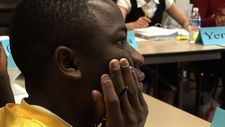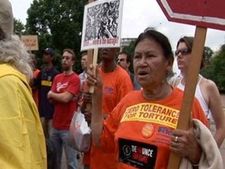In the decade since the Abu Ghraib scandal broke, discussion of torture has been widespread, but one issue has been largely overlooked: what happens to people after they have been tortured? How does it affect them over the years and decades to follow? Kathy Berger and Ines Sommer’s challenging film Beneath the Blindfold meets survivors and lets us hear their stories. It’s Kathy’s cinematic début and we asked her how the idea came about.
 |
| Remembering what happened. |
“We began this film really back in 2006, 2007,” she says. “For both my co-director Ines and I it was really in response to the abuse scandals at Guantanamo Bay and Abu Ghraib. We were horrified by how the mainstream media treated it with obfuscation and a series of euphemisms like ‘enhanced interrogation’. l knew a centre in Chicago, where we live, that treats survivors of torture. There are about 30 of them around the United States. We decided to approach them and see if we could find out what happens when someone is tortured, in the aftermath. We wanted to go directly to the source to shed light on what torture is and what it isn’t. It took them a while to vet us because obviously they wanted to make sure that we weren’t going to exploit their clients and that we were going to do them justice, so that’s how the film began.”
The survivors were enthusiastic about the idea of the film, she says, but not everyone felt able to participate. Some simply didn’t feel ready to speak about their experiences, whilst others still had family members in their countries of origin whom they didn’t want to endanger. This means, Kathy admits, that the film is slanted toward those who were the most healed – an awareness that may make you shiver all the more when you watch it.
“For the most part we’ve grown very close with the people who we interviewed,” Kathy says. “I’m in awe of them how they’ve put themselves back together and made a very hard journey to restore some kind of normalcy in their lives. That’s not to say there weren’t times when there was a lot of sadness during the interviews.” They found it difficult, she adds, but also somewhat cathartic.
 |
| Getting back to a normal life. |
One of the striking things for audiences to confront is the inclusion in the film of a US soldier who talks about his experiences at the hands of his own government. “I think for our audiences they’re most surprised by that - they’re shocked that our government would do that to one of our own,”” says Kathy. “Unfortunately sometimes documentaries are seen as like preaching to the converted that’s not completely true. We’ve screened the film to students who thought torture only involved bad people in other places.”
Generally audiences have been very supportive of the film, she says, and there have only been one or two people, across 20 or 30 screenings, who have taken issue with it. At some screenings participants in the film have gone onstage to take audience questions afterwards and this has added to its overall impact.
“It’s one thing see somebody up on screen; then to have them right there go into more detail gives it more depth. They can raise things not said in film and audiences really appreciate that. My co-director and I both feel that every time they speak they get more and more confident. A lot of it’s the idea of being embraced by people for the first time. Torturers always tell them "No-one knows that you’re here and no-one will ever care about what happens to you.” Now their story is out and people believe them.”
 |
| Taking action. |
“One of the reasons the Scottish Mental Health Arts and Film Festival reached out to us is that many of the survivors approached healing in a variety of ways and the arts are a major part of their healing. Matilda writes poetry and creates artwork frequently on an easel set up in her bedroom and that’s been a big help to her. Hector is a therapist but he works a lot with a healing group and he presents his play [about torture] all over the world.
“When you’re doing documentary films you always have to strike a balance. You have to reach into the hearts and the minds of your audience but you don’t want to be very intrusive. Matilda, Mario and Hector were not completely out about what happened to them when we started filming so we protected their privacy. Healing is definitely part of the story, expressed in nuanced ways showing the totality of them as people not just pathologising them. We wanted to show the totality, the fullness of lives, to make connection possible for the audience. We show their spouses, their children, their poetry so viewers don’t only see them as other.”
One of the things Kathy didn’t anticipate was how people who had experienced other kinds of trauma would connect with the film, but once they started screening it, people in audiences started sharing their stories. “A domestic abuse survivor put her hand up and said “I can connect with this,” and a victim of rape said the same. We did not make film with that intention so it’s been interesting. It’s been a real learning curve.”
Her main focus now is on promoting and distributing the film; she estimates that it will take about three years to get it launched into the educational distribution market. In the meantime, ongoing special screenings are helping to change people’s perceptions of the impact of torture for good.
If you would like to help torture survivors in the UK, you can contact Freedom From Torture.





















